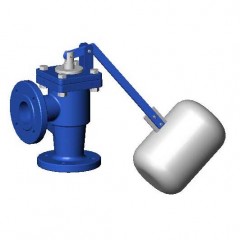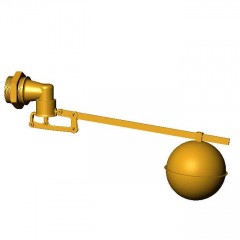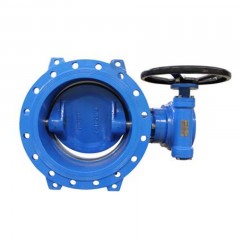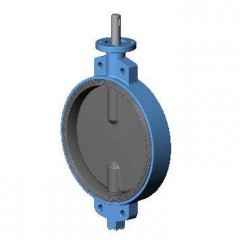Diaphragm valve – straight type
The diaphragm valve can be of different designs (straight, curved). It is characterised by its closing mechanism, which occurs via internal diaphragm deformation until contact with the internal layer of the valve is obtained. Especially used for chemical applications, it is also used for pharmaceutical and food-processing applications.
| Body material | Float material |
| Cast Iron | Butyl |
| PN ( end ) | End |
| Pn 10 | Flanged |
| Contact sealing | Operation system |
| Rubber | Handwheel non rising stem |
Diaphragm valve – weir type
The diaphragm valve can be of different designs (straight, curved). It is characterised by its closing mechanism, which occurs via internal diaphragm deformation until contact with the internal layer of the valve is obtained. Especially used for chemical applications, it is also used for pharmaceutical and food-processing applications.
| Body material | Float material |
| Cast Iron | Butyl |
| PN ( end ) | End |
| Pn 10 | Flanged |
| Contact sealing | Operation system |
| Rubber | Handwheel non rising stem |
Straight type balanced float valve – cast iron – flanged
The float valve’s purpose is to control the highest level of a given basin or cistern. Its role is to supply or not supply the basin and to avoid overflowing. There are offset float valves for large diameter valves in order to reduce the dimensions of the floats.
| Body material | Float material |
| brass | Stainless steel |
| PN ( end ) | End |
| Pn 10 | Flanged |
| Contact sealing | |
| EPDM |
Straight type balanced float valve data sheet
Angle type balanced float valve – cast iron – flanged
The float valve’s purpose is to control the highest level of a given basin or cistern. Its role is to supply or not supply the basin and to avoid overflowing. There are offset float valves for large diameter valves in order to reduce the dimensions of the floats.
| Body material | Float material |
| Cast Iron | Stainless steel |
| PN ( end ) | End |
| Pn 10 | Flanged |
| Contact sealing | |
| EPDP |
Angle type balanced float valve data sheet
Float valve – brass – female BSP
The float valve’s purpose is to control the highest level of a given basin or cistern. Its role is to supply or not supply the basin and to avoid overflowing. There are offset float valves for large diameter valves in order to reduce the dimensions of the floats.
| Body material | Float material |
| brass | Copper |
| PN ( end ) | End |
| Pn 10 | Bsp female/female |
| Contact sealing | |
| Stainless steel |
Gate Valve
Gate valve is a full bore valve. Thanks to the metal/metal seat, those valves are able to respond to specific operating conditions (high pressure, high temperatures). Its production is varied (cast iron, steel, stainless steel, duplex, etc.), it can therefore be used for numerous applications like the service industry and the chemical and oil industries
Double eccentric type butterfly valve with flanges
This double eccentric type butterfly valve is especially adapted to water supply and drinking water pipelines.
Teclarge – Butterfly valve with flanges
This valve is offered from DN350 to DN1200. This model has the same specifications as the Tecfly for PN10/16 service pressures. There is a wafer type and a flanged version (Teclarge FL).
Butterfly valve with sleeve
This valve with sleeve is available from DN32/40 to DN300, PN10/16/ASA150/JIS10K. It can respond to a wide variety of applications thanks to the numerous versions of sleeves (EPDM, NBR, FPM, PTFE, etc.) and discs (cast iron, stainless steel, aluminium bronze, duplex, etc.).Read more
Automatic Pinch Valve
The pinch valve is a full bore valve that shuts via manual or automatic strain from an elastomer socket. It is mainly used in the waste water industry, for sludge, or in the case of abrasive products like pneumatic conveying, or conveying powders or pulverulent substances…
| Body material | Sleeve material |
| Cast aluminium | Natural rubber |
| PN ( end ) | End |
| Pn6 | Flanged |
| Contact sealing | Operation system |
| Rubber | Without actuator |









